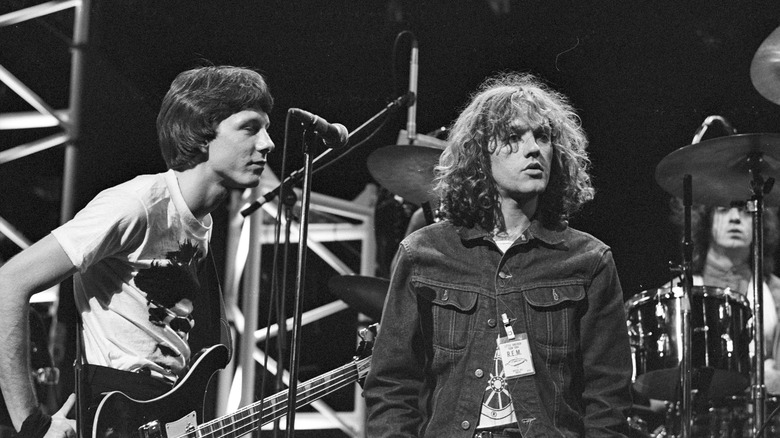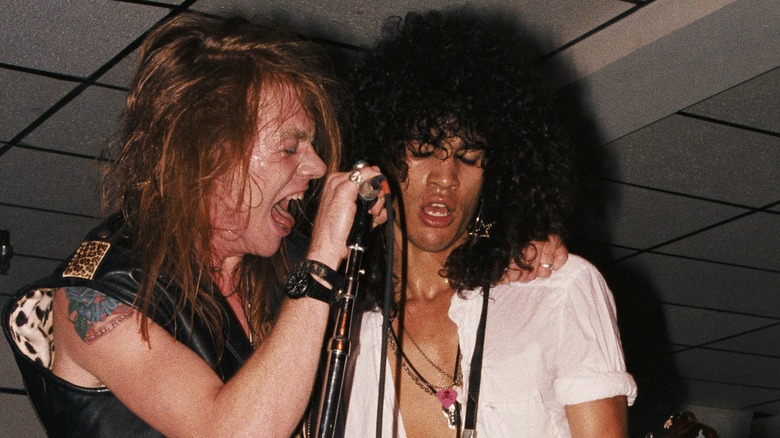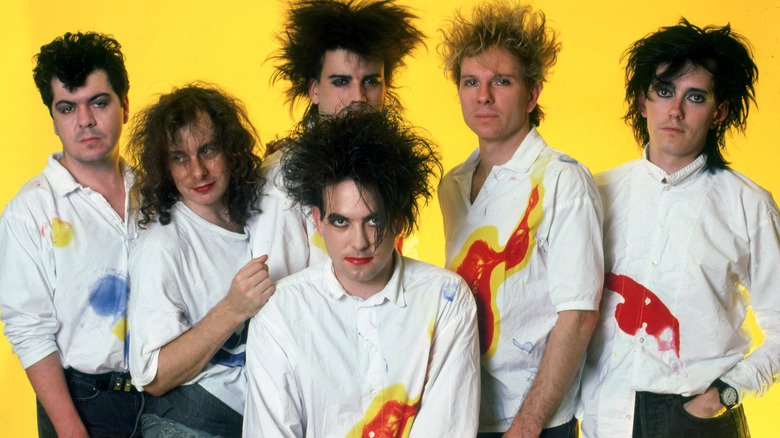The '80s Band With The Worst Lead Singer Might Surprise You
The decade of the 1980s saw its fair share of great music. Genres such as New Wave, punk rock, and hip-hop, though they didn't necessarily originate in the 1980s, certainly came into their own in that decade, bringing with them acts such as the Thompson Twins, Bad Religion, and Run-DMC, respectively, among others. Glam metal emerged from seedy clubs on the Sunset Strip and into the mainstream, making bands like Mötley Crüe and Poison household names. The Second British Invasion brought immense popularity to acts like Duran Duran, Spandau Ballet, and A Flock of Seagulls. And of course, the influence of MTV on popular music can not be understated.
While individual performers (with backup bands, of course) like Michael Jackson, Elton John, and Lionel Ritchie got big in the 1980s (or got big before and stayed big throughout), the decade also saw the popularity of multiple bands.
Grunge asked 598 U.S.-based readers which band has/had the worst lead singer. Here are the "winners."
Our readers are wrapped around Sting's finger
Sting, whose real name is Gordon Sumner according to Britannica, grew up liking The Beatles, as did a lot of young English boys of his generation. He also developed a fondness for jazz. And in what may be something of a departure from the typical career trajectory of famous rock stars, he got a college education and worked for a while as a teacher; indeed, his work with teenage students, and the sexually-charged atmosphere of mutual attraction between him and them, influenced one of his most popular songs, "Don't Stand So Close To Me," according to his website.
Though he's been known as a wildly successful solo artist for much of his life and career, Sting got big as the lead vocalist for The Police. With a string of hits in the early 1980s, including the aforementioned song about schoolgirl crushes, as well as "Every Little Thing She Does Is Magic," "King of Pain," and countless others, the band sold tens of millions of records and won multiple Grammy awards.
Our readers are generally on-board with the Sting-The Police combination: Only 16.89% believed that he was the worst lead singer of his band.
Our readers are losing their religion over Michael Stipe
When you think of music "scenes," your mind may be drawn to the seedy clubs of L.A.'s Sunset Strip, New York's Lower Manhattan, or London's West End, and the music that originated within them at various times. What you might not think of as a music scene is a sleepy Georgia college town.
In fact, the town of Athens, Georgia, has played at least a partial role in the development of several bands, including the B-52's and Pylon, according to Vinyl Me Please magazine. But perhaps the biggest names to come out of Athens are those of Bill Berry, Peter Buck, Mike Mills, and Michael Stipe, four University of Georgia students who formed the band R.E.M.
Though the band had its fans and had garnered some critical success in its early years, it achieved its first major mainstream success in 1987 with the release of the single, "The One I Love," and indeed, Slant magazine called it the 38th-best single of the 1980s.
Stipe was with R.E.M. from the beginning and stayed with them until they amicably split up after a few decades. Grunge readers seem to be happy with Stipe and his handling of the job: only 17.56% said he was the worst lead singer of his band.
Our readers have found what they're looking for in Bono
The band U2 got started in the most direct way possible: Larry Mullen, a student at a Dublin school, wanted to start a band, so he put up a notice on the message board at school, and soon enough, he was holding auditions, according to the band's website. Never mind that neither he nor any of his teenage companions could actually play instruments particularly well. "[We were] a band before we could play," its lead singer would joke over the decades.
That lead singer was a young lad named Paul Hewson, who performs under the mononym Bono.
With their politically-charged lyrics sometimes touching on religious themes, and (initially) against the backdrop of the waning years of "The Troubles" (the decades-long and sometimes-violent conflict between the U.K. and separatist group the Irish Republican Army), U2 became one of the biggest and best-selling bands of all time, sometimes re-inventing themselves over the decades.
Considering their staying power, it should come as no surprise that comparatively few of our readers — 17.56% of them — think Bono is the worst lead singer of his band.
Axl Rose is a sweet child o' our readers
Back in 1985, members of L.A. bands Hollywood Rose and L.A. Guns were all living together when Axl Rose, who had previously provided lead vocals for both groups, formed up with a few friends to create a new band, Guns N' Roses, according to The Quietus. Just a couple of short years later, the band enjoyed explosive popularity with the release of its album, "Appetite For Destruction," and its hit singles, which included "Sweet Child O' Mine" and "Welcome to the Jungle."
Over the next several decades, the band would continue in various iterations, but at its heart would always be Axl Rose. And Rose quickly developed a reputation for being one of the most temperamental and erratic performers in the history of popular music, according to Rolling Stone. Indeed, in what may well be one of the most diplomatic sentences ever written, bandmate Slash called him "hard to get along with." Similarly, according to a companion Rolling Stone report, Rose developed a reputation for showing up to work late, leaving early, or dropping out of site for extended periods of time.
Despite his legendary bad behavior, Grunge readers seem to think that Rose's talent is the true star of the show. Only 17.39% think he is the worst lead singer of his '80s band.
Our readers aren't in love with Robert Smith on Friday or any day
The Cure emerged from the far London suburbs in the late 1970s, according to Rock Archive, and went through several iterations over the years. Beginning with the post-punk movement, the band later found their sound in a brooding and dark style that would later inform the Goth subculture, as Post-Punk reported. Later, they wrestled with moving their sound into a more radio-friendly, pop style.
While the band's membership has changed over the years, one constant through it all has been founder and lead singer Robert Smith. The Blackpool musician has been known as much for his "look" — lipstick, eye shadow, makeup-provided pallid complexion, wisp of wiry unkempt hair atop his head, and black clothes — as his actual duties helming his band.
However, it seems that Smith's singing voice is something of an acquired taste. Described by The New York Times as "irritating," "quavery," and "morose," it seems that, to some critics, it may be more suited to his band's dark phase than its later pop-oriented focus. Our readers would tend to side with the Times critic: a clear plurality — 27.09% — thought Smith was the worst lead singer of his band in the '80s.





